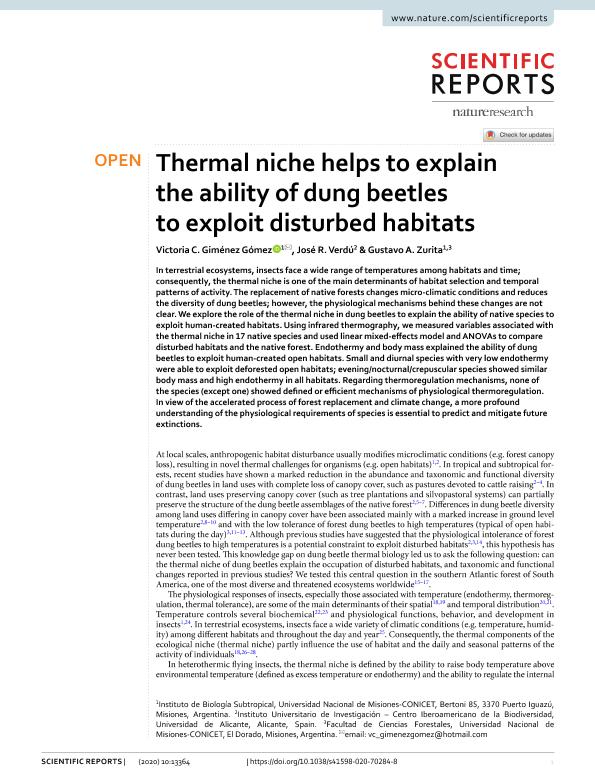Mostrar el registro sencillo del ítem
dc.contributor.author
Gimenez Gomez, Victoria Carolina

dc.contributor.author
Verdú, José R.
dc.contributor.author
Zurita, Gustavo Andres

dc.date.available
2020-08-20T20:37:54Z
dc.date.issued
2020-08
dc.identifier.citation
Gimenez Gomez, Victoria Carolina; Verdú, José R.; Zurita, Gustavo Andres; Thermal niche helps to explain the ability of dung beetles to exploit disturbed habitats; Nature Publishing Group; Scientific Reports; 10; 13364; 8-2020; 1-14
dc.identifier.issn
2045-2322
dc.identifier.uri
http://hdl.handle.net/11336/112081
dc.description.abstract
In terrestrial ecosystems, insects face a wide range of temperatures among habitats and time;consequently, the thermal niche is one of the main determinants of habitat selection and temporalpatterns of activity. The replacement of native forests changes micro-climatic conditions and reduces the diversity of dung beetles; however, the physiological mechanisms behind these changes are not clear. We explore the role of the thermal niche in dung beetles to explain the ability of native species to exploit human-created habitats. Using infrared thermography, we measured variables associated with the thermal niche in 17 native species and used linear mixed-effects model and ANOVAs to compare disturbed habitats and the native forest. Endothermy and body mass explained the ability of dung beetles to exploit human-created open habitats. Small and diurnal species with very low endothermy were able to exploit deforested open habitats; evening/nocturnal/crepuscular species showed similar body mass and high endothermy in all habitats. Regarding thermoregulation mechanisms, none of the species (except one) showed defined or efficient mechanisms of physiological thermoregulation. In view of the accelerated process of forest replacement and climate change, a more profound understanding of the physiological requirements of species is essential to predict and mitigate future extinctions.
dc.format
application/pdf
dc.language.iso
eng
dc.publisher
Nature Publishing Group

dc.rights
info:eu-repo/semantics/openAccess
dc.rights.uri
https://creativecommons.org/licenses/by/2.5/ar/
dc.subject
DUNG BEETLES
dc.subject
THERMAL NICHE
dc.subject
RESPONSE MECHANISMS
dc.subject
DISTURBED HABITATS
dc.subject.classification
Zoología, Ornitología, Entomología, Etología

dc.subject.classification
Ciencias Biológicas

dc.subject.classification
CIENCIAS NATURALES Y EXACTAS

dc.subject.classification
Ecología

dc.subject.classification
Ciencias Biológicas

dc.subject.classification
CIENCIAS NATURALES Y EXACTAS

dc.subject.classification
Biología

dc.subject.classification
Ciencias Biológicas

dc.subject.classification
CIENCIAS NATURALES Y EXACTAS

dc.title
Thermal niche helps to explain the ability of dung beetles to exploit disturbed habitats
dc.type
info:eu-repo/semantics/article
dc.type
info:ar-repo/semantics/artículo
dc.type
info:eu-repo/semantics/publishedVersion
dc.date.updated
2020-08-19T19:31:56Z
dc.identifier.eissn
2045-2322
dc.journal.volume
10
dc.journal.number
13364
dc.journal.pagination
1-14
dc.journal.pais
Reino Unido

dc.journal.ciudad
Londres
dc.description.fil
Fil: Gimenez Gomez, Victoria Carolina. Consejo Nacional de Investigaciones Científicas y Técnicas. Centro Científico Tecnológico Conicet - Nordeste. Instituto de Biología Subtropical. Instituto de Biología Subtropical - Nodo Puerto Iguazú | Universidad Nacional de Misiones. Instituto de Biología Subtropical. Instituto de Biología Subtropical - Nodo Puerto Iguazú; Argentina
dc.description.fil
Fil: Verdú, José R.. Universidad de Alicante; España
dc.description.fil
Fil: Zurita, Gustavo Andres. Universidad Nacional de Misiones. Facultad de Ciencias Forestales. Instituto de Biología Subtropical - Sede Puerto Iguazú; Argentina. Consejo Nacional de Investigaciones Científicas y Técnicas. Centro Científico Tecnológico Conicet - Nordeste. Instituto de Biología Subtropical. Instituto de Biología Subtropical - Nodo Puerto Iguazú | Universidad Nacional de Misiones. Instituto de Biología Subtropical. Instituto de Biología Subtropical - Nodo Puerto Iguazú; Argentina
dc.journal.title
Scientific Reports
dc.relation.alternativeid
info:eu-repo/semantics/altIdentifier/url/http://www.nature.com/articles/s41598-020-70284-8
dc.relation.alternativeid
info:eu-repo/semantics/altIdentifier/doi/http://dx.doi.org/10.1038/s41598-020-70284-8
Archivos asociados
